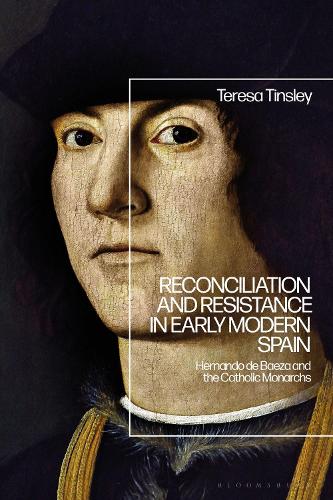
Reconciliation and Resistance in Early Modern Spain: Hernando de Baeza and the Catholic Monarchs
(Hardback)
Available Formats
Publishing Details
Reconciliation and Resistance in Early Modern Spain: Hernando de Baeza and the Catholic Monarchs
By (Author) Dr Teresa Tinsley
Bloomsbury Publishing PLC
Bloomsbury Academic
19th May 2022
United Kingdom
Classifications
Professional and Scholarly
Non Fiction
History of religion
Ethnic studies
946.04
Physical Properties
Hardback
232
Width 156mm, Height 234mm
Description
This book offers an original perspective on the emergence of early modern Spain from multi-faith Iberia. It uses the eventful career of Hernando de Baeza an interpreter, intermediary, and author positioned at the intersection of the so-called three cultures of medieval Iberia (Judaism, Islam and Christianity) as a thread to connect the conflicts, controversies and preoccupations of an age in which Christianising the whole world seemed an attainable dream. Teresa Tinsley draws on a wealth of extensive archival evidence, together with Baezas own memoir on the downfall of Muslim Granada (translated here for the first time), to demonstrate the widespread resistance to the authoritarian and exclusionary Christianity which would come to be associated with Spain, the Inquisition, and the Catholic Monarchs of the period. In the process, Tinsley provides a nuanced alternative account of the tensions, compromises and competing interests which underlay Spains emergence as a world power.
Reviews
This volume is a sensitive and well-researched study of a foundational period in the history of early modern Spain. Through an analysis of the career and writings of Hernando de Baeza, it offers a fresh and nuanced perspective that brings to the fore questions of religious difference, inter-cultural contact, and good government. * Rosa Vidal Doval, Queen Mary, University of London, UK *
A sensitive and revealing portrait of a deliberately elusive figure, who delicately negotiated a path through the thicket of religious antagonism and intolerance that marked the reigns of the Catholic Monarchs. Tinsley uncovers a cultured, well-connected, and cross-cultural character with converso origins who, while trusted by 'both sides'--Christian and Muslim--and personally known to Ferdinand and Isabella, subtly rejected ethnic binaries and the forced erasure of cultural identities, thus de-Othering both Muslims and Jews. * Simon R. Doubleday, Professor of History, Hofstra University, USA *
Author Bio
Teresa Tinsley is a linguist and researcher who obtained her PhD in History from the University of Exeter, UK in 2019. She is the author of numerous articles exploring 15th and 16th century Spanish history published in both English and Spanish.
